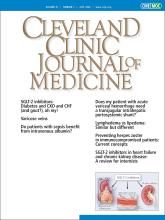ABSTRACT
Herpes zoster (HZ) incidence is much higher in immunocompromised individuals than in immunocompetent individuals. HZ also occurs at a younger age and is often more severe in immunocompromised persons. Preventive strategies center around the recombinant zoster vaccine (RZV), which is approved for immunocompromised adults age 19 and older. Identifying those at greatest risk is critical. For those considering vaccination, evidence gaps regarding vaccine efficacy, toxicity, length of protection, and potential effects on underlying conditions may complicate shared and informed decision-making. Recent data have filled some of these gaps, with several societies issuing recommendations regarding vaccination. Remaining gaps are currently addressed by expert opinion.
- Copyright © 2024 The Cleveland Clinic Foundation. All Rights Reserved.
- Cassandra Calabrese, DO
- Elizabeth Kirchner, DNP
- James Fernandez, MD, PhD
- Leonard H. Calabrese, DO⇑
- Department of Rheumatologic and Immunologic Disease, Cleveland Clinic, Cleveland, OH; Professor, Cleveland Clinic Lerner College of Medicine of Case Western Reserve University, Cleveland, OH
- Address:
Leonard H. Calabrese, DO, Department of Rheumatologic and Immunologic Disease, A50, Cleveland Clinic, 9500 Euclid Avenue, Cleveland, OH; calabrl{at}ccf.org
ABSTRACT
Herpes zoster (HZ) incidence is much higher in immunocompromised individuals than in immunocompetent individuals. HZ also occurs at a younger age and is often more severe in immunocompromised persons. Preventive strategies center around the recombinant zoster vaccine (RZV), which is approved for immunocompromised adults age 19 and older. Identifying those at greatest risk is critical. For those considering vaccination, evidence gaps regarding vaccine efficacy, toxicity, length of protection, and potential effects on underlying conditions may complicate shared and informed decision-making. Recent data have filled some of these gaps, with several societies issuing recommendations regarding vaccination. Remaining gaps are currently addressed by expert opinion.
- Copyright © 2024 The Cleveland Clinic Foundation. All Rights Reserved.






